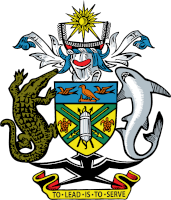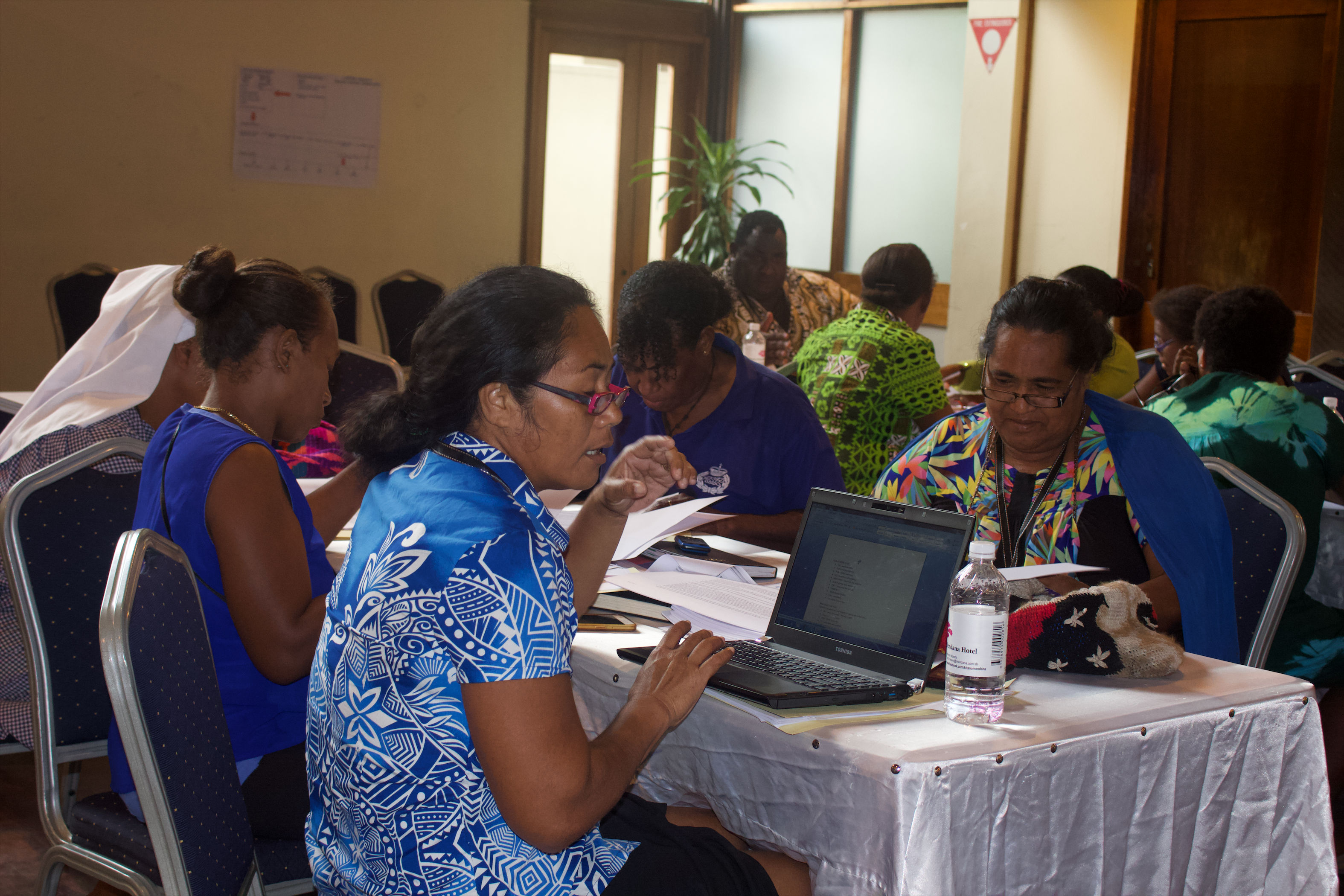About 80 service providers from Malaita, Isabel, Temotu, Western and other provinces have gathered in Honiara to find ways to further improve support for women and girl victims of sexual and gender-based violence.
The SAFENET National Inception Workshop, at the Mendana Hotel in Honiara from 8th to 9th May, presents the findings from months of consultations in the four provinces, about the SAFENET approach to improving services and support for victims of violence against women and girls - often called ‘survivors’.
Central to the SAFENET approach is ensuring all frontline services providers – from police to hospital and crisis centre staff – are better coordinated to provide the best possible survivor-centred response and ongoing support to for gender-based violence victims.
The SAFENET network of government and non-government organizations is led by the Ministry of Women, Youth, Children and Family Affairs (MWYCFA) supported by UN Women, through the Pacific Partnership to End Violence Against Women and Girls (Pacific Partnership) funded by the European Union and Australian Government with support from UN Women.
The two days SAFENET National Inception Workshop is part of a weeklong Gender Equality and Women’s Development National Stakeholders workshop held in Honiara.
Dr Cedric Alependava, Permanent Secretary for MWYCFA, explained “this is an incredibly important workshop for rural and urban service providers to come together and agree on ways that we can best ensure women and girls victims of gender-based violence get better services and support.”
“This builds on many years of work by MWYCFA and the SAFENET network, with ongoing technical guidance and support from UN Women, which this year continues through the new Pacific Partnership to End Violence Against Women and Girls thanks to funding from the Australian Government and European Union,” Dr Alependava said.
The workshop is the culmination of months of consulting with provincial government, faith-based groups, civil society and other organisations about the SAFENET approach and its national implementation.
The consultations were led by MWYCFA with support from UN Women, from November 2018 to March 2019, across Malaita, Isabel, Temotu and Western provinces.
Consultation findings being discussed at this week’s national workshop cover topics including the SAFENET Standard Operating Procedures; guiding principles and survivor-centred approaches; SAFENET governance systems; minimum standards and data collection; and other aspects of the SAFENET approach.
The survivor-centred approach is clearly outlined in the SAFENET Guidebook of Standard Operating Procedures for the Multisectoral Response, Referral and Coordination of Sexual and Gender Based Violence (GBV), launched late 2018 and now being rolled out nationally through the provincial consultations and the national workshop.
Speaking at the SAFENET event, UN Women Fiji MCO Deputy Representative, Sarah Boxall, said UN Women is proud to be continuing its long-term commitment to supporting initiatives for survivors of sexual and gender-based violence (GBV) in Solomon Islands.
“Since 2012, UN Women has been providing dedicated support to prevent and respond to violence against women and girls in Solomon Islands, by strengthening capacity within government and civil society to expand survivor services and stop violence before it starts,” said Ms Boxall.
“The Pacific Partnership will build on previous joint programmes such as the UN-Solomon Islands Government Joint Programme and the UN Essential Service Programme (ESP) in Solomon Islands, to expand access to services to the most remote and rural parts of the country and support the implementation of the government’s key policies addressing this issue.”
At the SAFENET National Inception Workshop, MWYCFA Permanent Secretary, Dr Cedric Alependava, highlighted how the national government has at the top of its agenda the need to improve gender equality and women’s empowerment, and to significantly reduce levels of sexual and gender-based violence.
“A key priority of the MWYCFA in its implementation of the Ending Violence Against Women and Girls Policy and the national Family Protection Act 2014 is to ensure survivors of gender-based violence have access to essential quality services both at national and provincial levels,” said
“For this reason, we strongly support and the SAFENET Guidebook and its Standard Operating Procedures that aim better align government and non-government service providers in order to assist and support survivors and victims of domestic violence in a way that ‘does no harm’ and is survivor-centred,” Dr Alependava said.
“The Standard Operating Procedures developed by SAFENET better coordinate the various frontline response services – from police to hospital, legal, faith based and Christian care centre staff – to provide the best possible survivor-centred response, referrals and ongoing support to women and girl survivors of violence,” Dr Alependava said.
The SAFENET network was established to strengthen response, referral and coordination of Sexual and Gender Based Violence (SGBV) services in the Solomon Islands. Members of the SAFENET network are: Ministry of Women, Youth, Children and Family Affairs (MWYCFA); Ministry of Health and Medical Services; Royal Solomon Islands Police Force (RSIPF); Public Solicitors Office (PSO); Family Support Center (FSC), Christian Care Center (CCC) and Solomon Islands Planned Parenthood Association. As SAFENET is rolled out to the provinces, its membership is increasing to include local civil society and women’s groups who play a key role in referring support services to survivors of gender-based violence who live in remote villages.
The Guidebook was developed over several years by the SAFENET members under the leadership of the Solomon Islands Government, written with extensive technical support from UN Women Fiji MCO, and funded through the global UN Trust Fund to End Violence Against Women.
The SAFENET network continues to be supported through UN Women and the Essential Services Programme (ESP) in Solomon Islands, through the new Pacific Partnership to End Violence Against Women and Girls funded by the European Union and Australian Government with support from UN Women. ESP and SAFENET was formerly supported by UN Women through funding from the Australian Government, from 2017-2019.
In Solomon Islands, data indicates about 64 per cent of the nation’s women experience physical or sexual intimate partner violence - twice the global average.

